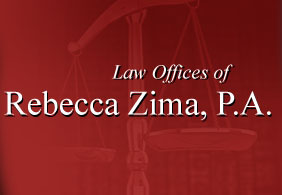The 4th amendment to the U.S. Constitution protects all citizens against unreasonable search and seizure of property by the government. To search your home, the police must have Probable Cause to believe that your home contains evidence of a crime or contraband. There are many different circumstances, but legal search of a home often will require a judge to approve a Search Warrant. In the absence of a search warrant, the homeowner may consent to search of his or her home, but is not required to do so.
There are also many different standards required to search individuals and motor vehicles, depending on the circumstances. If you or your home were subjected to a search and subsequently arrested, there is a possibility that the search was unconstitutional and that the evidence would not be admissible against you. You should consult with an attorney as soon as possible. Call Rebecca Zima at 904.425.0038 for a free consultation.
Speaking to Police
How do you know if you are a suspect?
If the police read you your rights prior to questioning you, they are looking at you as a potential suspect rather than only as a witness. The only purpose the police have in advising you of your rights is to allow any statements you make to be admitted in court against you later. If this happens, you should ask for your lawyer to be present during any questioning and then consult with an attorney as soon as possible. Call Rebecca Zima at 904.425.0038 for a free consultation.
Can the police talk to my minor child without me present?
Depending on the age and the maturity of your child, probably. The police are required to take a couple of additional steps to protect a child suspect, such as notifying a parent, but they can also question older children without you there. If the police have contacted you or your child about being suspected of a delinquent or criminal act, you should consult with an attorney as soon as possible. Call Rebecca Zima at 904.425.0038 for a free consultation.
You have the right to remain silent. Anything you say can and will be used against you.
This right is based in the 5th amendment to the U.S. Constitution and its protection against self-incrimination. The State (and the police) bear the burden of proof in a criminal case, the accused is not required to prove anything. Your right to remain silent is very important. Even if you have not done anything wrong, any inconsistencies in your statement or mistakes in your memory can be admitted against you just as a true confession would be. Talking to the police is very unlikely to help your situation if you are a suspect; if they have enough evidence against you without your statement, you will be arrested. However, if they do not have enough evidence against you and need you to make inconsistent statements or confess, agreeing to talk to the police can actually help their case against you and does not benefit you at all.
You have the right to an attorney. If you cannot afford one, one will be appointed for you.
You actually have two distinct rights regarding legal representation in a criminal case. First, you have a right to an attorney during questioning by the authorities, a right which is based in the 5th amendment to the U.S. Constitution. Second, you have a right to an attorney when you have actually been charged with a crime, a right which is based in the 6th amendment to the U.S. Constitution. Important: The right to an attorney during questioning must be invoked–you must actually ask for or demand an attorney prior to or at any point during the questioning.
You have the absolute right to an attorney during any “custodial interrogation”. This means that you are being subjected to interrogation (any questioning) and that you are in custody at the time of the interrogation. In custody may mean you have already been arrested or not yet under arrest, but otherwise not free to leave. Once you say that you want an attorney, the police must stop all questioning of you. You must be clear in your request for an attorney. Call Rebecca Zima at 904.425.0038 for a free consultation.
If the police have contacted you and you believe that you may be suspected of a crime, you may consult and/or hire an attorney to be present with you during any questioning. You should consult an attorney as soon as possible. Call Rebecca Zima at 904.425.0038 for a free consultation.


